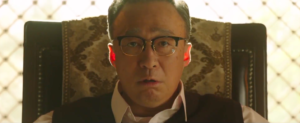
There’s a scene near the beginning of the second Austin Powers film (go with me here) where Austin’s mentor is explaining how he will travel back in time to complete a mission. Upon Austin’s confusion, the mentor tells him, “I suggest you don’t worry about this sort of thing and just enjoy yourself” before turning to the camera and adding “that goes for you all, too”. When watching film and television concerning time travel, the inherent perplexities often end up needing this caveat, if the writers aren’t careful. From Back to the Future to Lost, there are infinite examples of just how tricky it can be for these stories to hang together.
Add in the extra spice of reincarnation, and you’ve got yourself an extremely difficult mixture to work with. This is the fate that ultimately befalls JTBC’s blockbuster Reborn Rich, an intricate revenge drama following the rise and fall of the fictional Soonyang Group, and one of their murdered employees, reincarnated into the body of the family’s youngest grandson. After an opening half that delivered rich characterisation and bravely complicated story arcs around financial deals and coups, the drama concludes, after much more of the same, by failing to satisfyingly answer the biggest questions that it has set up.
This review contains spoilers.
At the series’ midpoint, we were submerged in a series of byzantine negotiations, tricks and takeovers as Jin Do-Jun—the reincarnated murdered employee Hyeon-woo, played by Song Joon-ki—manipulates his new, greedy family into betraying each other and themselves. There is slightly less use of Korean history to contextualise the economic twists and turns as the drama continues, with the notable exception of the (wonderfully timely) 2002 World Cup in Korea and Japan. The deals do, however, continue to take up the vast majority of the plot, almost to the show’s end.
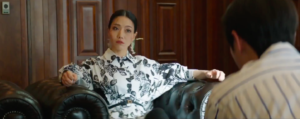
These various manoeuvres are still engagingly played and presented clearly enough for the general points to come across. Jo Han-chul as the chaebol’s second son Dong-ki gets a particular chance to shine as the pantomime greedy uncle, while Kim Nam-hee gets to chew some delicious scenery as the violent-tempered eldest grandson Jin Seong-jun. Kim Shin-rok also keeps up the hysteria throughout as the chaebol’s only daughter, and manages to remain relentlessly entertaining in her spite and childishness.
The problem with Reborn Rich doesn’t come from this plotline itself, but more from focussing on it at the expense of so much else. Just like Austin Powers’ boss, it feels like the writers here are asking the audience to just please concentrate on how dramatic and clever all the economic power playing is, and don’t think too much about how we got here.
But when a show centres around the premise of revenge via reincarnation (it’s literally in the English name of the show), that premise really does need to bear out. However, in the closing episode of the series, it feels as though the writers have almost forgotten the original premise, so unsure are the explanations.
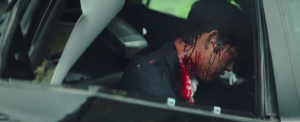
Take, for example, the murder of the Do-jun character at the end of the 15th episode. Remember, this is Song Joong-ki as murdered employee Hyeon-woo, who has been living as Do-jun for the past 15 years. Confusing, I know. Anyway, it has been revealed to the audience several episodes previously that Do-jun, grandson and potential heir to the Soonyang throne, dies in a car accident. At episode 15, this car accident occurs, and it is revealed that Hyeon-woo, Song’s original character, is directly involved in said accident, resulting in the actor staring at himself as his second self dies.
If this explanation sounds unclear, that’s because the plot point itself is so murky. It is muddied even further in the series’ final episode, where Hyeon-woo returns to his initial self, surviving what looks like a point-blank gunshot to the head, meeting the same characters that he has interacted with as Do-jun, but without them recognising him. Song as Hyeon-woo encounters Seo Min-young (Shin Hyun-bin), Do-jun’s love interest, along with Oh Se-hyun (Park Hyuk-kwon), Do-jun’s partner at the investment firm that he co-founded, without them recognising him at all.
This issue might be more easily explained if there was a stronger distinction between the Hyeon-woo character and the Do-jun character, but, as they are played by the same actor with the same clothing and hair style (the only discernible difference is that Hyeon-woo sometimes wears glasses), the lines are too blurred. In addition to this, the writing does not seem to want to concern itself with any of the emotional implications that living two completely disparate lives within the same time frame would bring.
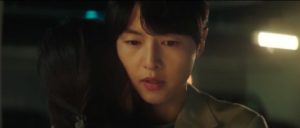
There is some effort made with Min-young’s character (we see Hyeon-woo almost asking her on a date, given that she was his fiancé when he was Do-jun, but backing out), that hint at Hyeon-woo’s inner turmoil. However, with his former investment firm partner, one small scene of meeting and explanation is limply offered before their relationship reverts to exactly what it was when Hyeon-woo was a totally different person.
There is virtually no space given to the huge psychological impact that living as a self in a different body would have, and even less so to how it would feel to then return to that body, after almost dying. Whilst this drama clearly positions itself as a political revenge drama about the world of chaebols, it has used the device of reincarnation, but shows almost no interest in doing anything with it.
This isn’t simply a problem of the show’s finale, and it does serve to amplify flaws that have arisen earlier in the series. Questions that felt like they would get answers remain floating in the air, again leaving a sense of total disinterest in the central conceit that the show has. The most pressing of these concerns Hyeon-woo/Do-jun’s relationship to his real family as he grows through life as another person in his own past.

While the first half of the series gave us heart-warming moments where he went back to his parents’ restaurant to be fed by his mother, the second half almost entirely forgets that the Do-jun character has another family, another life. His interactions with his desperate, poverty-stricken father end up feeling like side notes, reminders of the overall premise, rather than the emotional touchstones that they are designed to be.
The illustrations of the passing of time become clumsy in the series’ final moments too. For a programme that has worked so hard to show the unfurling of a personal history through the backdrop of a nation’s story, some of the costuming decisions become almost laughable. The awkward wigs and obviously artificially-greyed hair that several characters sported in the series’ opening scenes get a full showing in the final episode, but, after so much delicate, gradual building to various plot points, these markers seem forced. Do-jun’s mother, played by Jung Hye-young, draws the shortest straw with her strange grey hair, but the same styling appears on multiple characters to bizarre effect.
It’s a shame that there are these moments of clumsiness with the styling, as there are more impressive visual moments. Most of these come through the beautifully lit and composed shots of elegant boardrooms and great mansions, emphasising the extent of this family’s wealth and power. There are even a few split screen shots involving Song both as Do-jun and Hyeon-woo, which are experimental enough to overcome how obvious their symbolism is.
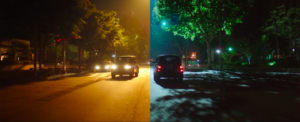
In the end, Reborn Rich is a good drama that falls short of greatness by ignoring the implications and potential of its main idea. Whilst Austin Powers could get away with asking us not to think about the complicated stuff, here, it is precisely the point. This fumbling of the reincarnation elements of the series undermine the skilfully done boardroom dramas that were built around it.
Whilst this issue doesn’t seem to have done its ratings any harm—Reborn has in fact become the second highest rated drama ever on Korean cable TV in terms of viewership—it is ultimately unsatisfying. Reborn Rich showcases great performances and a great understanding of the intricacies of the poisonous world of the superrich. It is just disappointing that it couldn’t achieve a full, complete narrative by embracing the most abstract element at the core of its story.
(YouTube. Images via JTBC.)


